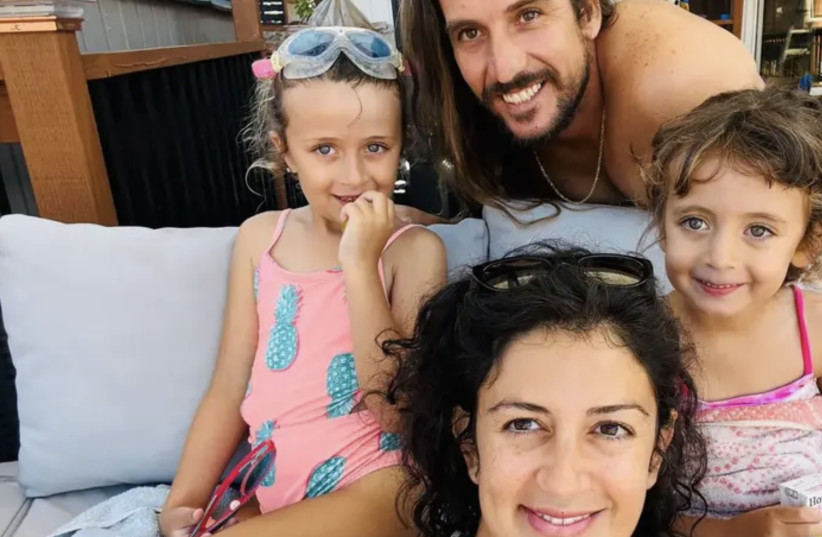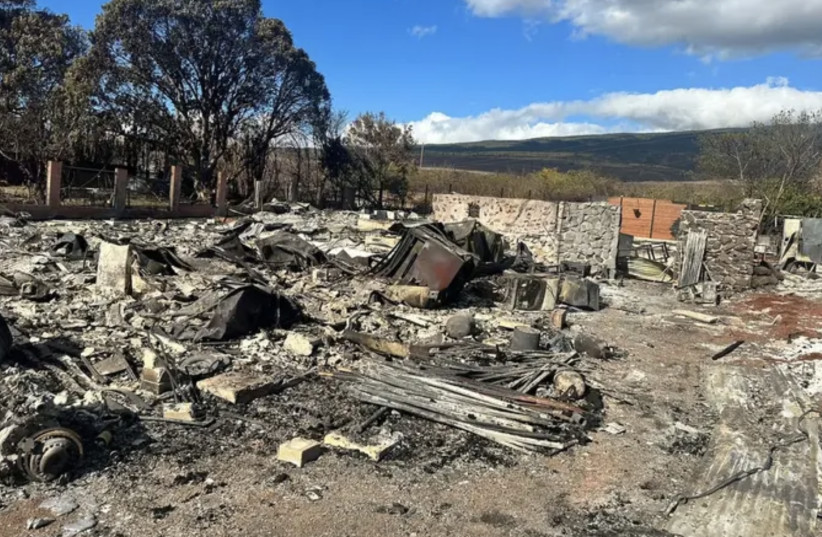The authorities on the island of Maui, which has become the epicenter of the fires that have plagued the Hawaiian islands in recent days, announced Saturday that the death toll has risen to at least 80 people. Thus, the natural disaster that struck the island has become the deadliest in the history of the Southwestern US state.
"The tourist paradise turned into a hell on earth," recounted Eden Brook-Adams, 38, who lives on the island with her husband and their two daughters.
"We are alive," said Eden, who managed to escape the turmoil in Maui just moments before the flames engulfed their dream house and consumed it entirely. "It means that our home, along with the business we started seven months ago, has gone. All our savings, and the huge mortgage we could only manage through hard work, have gone up in flames. My bakery, which was a part of the property, burned down, and my husband Jason's fishing boat also burned."
Eden, originally from the neighborhood of Mea She'arim in Jerusalem, broke into tears when recalling the events: "It started as a hurricane, with winds of over 100 kilometers per hour – something unprecedented here. When I returned home from work, I went upstairs to shower and change clothes. Then I smelled smoke, so I went out to the balcony and saw a massive black smoke cloud 200 meters away from me. There were no alerts because there was no phone, no internet, and no cell service. There was no way to contact emergency services or the police. Nobody knew what was happening."
"At this wind speed, within five minutes, the fire was already here," Eden explained and continued: "We gathered the girls, got into the car, and started driving, trying to escape the fire by heading north on the island, towards our friends' house.
"I will never forget the sight in the rearview mirror – I could see the fire behind us, and cars were fleeing just like us. Ahead, I saw telephone poles falling onto the road, and cars getting tangled in power lines. We couldn't help them because it was a choice between them or us, and we couldn't stop because the roads were narrow and those behind us were honking for us to keep moving. We drove through the chaos between cars that were stuck and some that were on fire, with people inside."

Escaping the Maui fires proved to be difficult
"We arrived safely on the other side. The house burned down completely, the business is gone, the bakery equipment, and the boat too. Everything turned to ashes and dust. There are hundreds of casualties here, probably even people we know and haven't heard from yet. But the four of us are alive. Now we need to worry about the girls – our 5 and 7-year-old daughters, who were supposed to start the school year on Wednesday. They waited for this for two months."
"I'm a practical person," Eden added. "I immediately started trying to find a rental home. But there's nothing. Everything burned down. They're talking about thousands of houses that have been affected in one way or another. People are hosting others in their homes, but they don't know how long this will last, or how long they'll be able to survive. We're not like big cities. We rely on tourism, and overnight our tourist paradise turned into a living hell. There are no tourists, and they'll have to rebuild everything before we can even talk about recovery. Without tourism, there's no life here."
'Almost everyone knows someone who was directly affected'
"Fortunately, my kids and I are together, and our house survived," said Omri Ashur, a 38-year-old Israeli businessman living in Maui. "We evacuated the neighborhood next to us. There are a lot of Israelis who lost their homes and businesses, but thank God we haven't heard of any casualties within the community. The numbers reported in the media don't reflect the true extent of the disaster, as not all the bodies have been recovered. It could reach hundreds more. The island is very small, and its population is only 150,000 people. It feels bigger because of the large number of tourists, but there aren't that many locals. So in an island like this, almost everyone knows someone who was directly affected."
Omri, a married father of two from Nahariya, recounted: "In our case, it was a different kind of complexity – my wife and I went to Portland because we had just sold our business and were obligated to guide the buyers. At that point, there wasn't even a fire. They were talking about a hurricane about 50 km away from the island, which wasn't uncommon. But then, the wind knocked down power poles, causing short circuits that ignited the island. Personally, I know at least four families who lost both their businesses and homes. Each house is worth between one to two million dollars. There is insurance and there's federal emergency assistance, but I'm sure that for the next two years, their main focus will be on rebuilding their lives."
"It happened on the night between Monday and Tuesday," Omri added. "In the US, there's a special alarm on mobile phones that alerts emergency authorities. So, my mother-in-law and our nanny woke up, immediately smelled the heavy smoke, informed us, and instantly began organizing our three and four-year-old kids, packing a few things in a hurry for evacuation. We guided them to get into the car and start driving towards the airport. While they were on their way, we bought them tickets and got them out of there, first on a flight to another island and then back to the mainland."
"We found a temporary apartment and from here, we're planning an extended vacation in Israel. Meanwhile, friends of ours on the island, whose house burned down, will move into our home. We intend to return to Maui and resume our lives. I will continue with my business, and my wife is supposed to start a new path in the high-tech industry. It warms my heart to see the solidarity within the Israeli WhatsApp groups in Maui. People are helping each other – finding temporary housing, providing fuel for those in need, furniture, clothes, toys for kids, and even monetary assistance. They set up crowdfunding accounts and donate to those who need it. This once again shows that there's nothing like the mutual support of Israelis, even when they're living abroad."

In parallel to the heavy toll imposed by the natural disaster and continuing to rise, local authorities reported this morning on hundreds of missing individuals, which could indicate a larger number of casualties and fatalities than previously reported in the American media. The evacuation of residents from the city comes just a few hours after residents of the neighboring resort town of Lahaina, considered a historic town in Hawaii, were allowed to return to assess the extent of the damage caused by the severe wildfires.
The dimensions of the damage and the scope of fatalities suggest that this is one of the deadliest natural disasters the island has ever experienced, and one of the most severe fire disasters in the history of the United States. The western part of Maui remains almost completely cut off, with only one major highway remaining open. According to local reports, residents still in the area have no access to electricity and water. Even for those who have access to water, authorities warned that it might be contaminated. Data collected from flights by the civilian Air National Guard of the United States and Maui's fire services indicate that thousands of structures have been damaged or destroyed by the fires, with over 1,000 structures affected in Lahaina alone.
The Environment and Climate Change portal is produced in cooperation with the Goldman Sonnenfeldt School of Sustainability and Climate Change at Ben-Gurion University of the Negev. The Jerusalem Post maintains all editorial decisions related to the content.
